Jaipur. With internet penetration in India, the country has become a large playground of disruption of various traditional sectors by changing customer behavior through startups. Earlier it was a battle on eCommerce and major players are Flipkart, Snapdeal and Amazon; then it was of Logistic Management Startups; Later it was Fin-Tech Startups and major focus was on eWallets, Investments, Banking and Tax Return solutions. Now it is headed towards disrupting healthcare market where even Govt. of India is also making moves. There are many mHealth apps actively working in India such as Practo, MeraPatient, 1mg, PharmEasy etc to facilitate health services on a click. It includes doctor-patient interactions, ePharmacy, Data Management etc.
Speaking on innovative service application in healthcare sector, Mr. Manish Mehta, Founder of MeraPatient App, says; “Like Zomato, Swiggy, Ola, Uber and many such more new players, have changed the behavior of customers in the respective sectors of level ground, it is now turn of a Healthcare sector to inject innovative marketing strategies and change the customer (patients) behavior. To change the behavior ‘doctor on video call’ facility can be quite impactful in India. It is the nextgen healthcare tech which is already popular in some countries like Ireland, US, UK, Canada and now this facility is all set to reach to the larger user base in India.”
India has comparatively the lowest ratios for a doctor per 1,000 patients amongst the developing countries. One-to-One interaction with a doctor is not only a time-consuming process but also an expensive one, especially in the private sector. But the behavior of patients generally found in India is always in favour of one-to-one consultation by doctors. Even though government hospitals and state-run health centres offer consultations either free of cost or at subsidized pricing, it’s not easy to get an access to these services for all citizens through mHealth due to lack of internet usage education. In this case, a trained healthcare staff that can play a dual role of providing education on using internet and consulting on health services will be in demand in the industry.
The most common challenge in shifting customer to mHealth is ‘technology adoption’, which is highly influenced by values and beliefs, ways of being, and identity. Actually, adaptive challenges require leadership behaviors which can be analyzed by marketer and can be applied or discarded based on feedbacks.




































